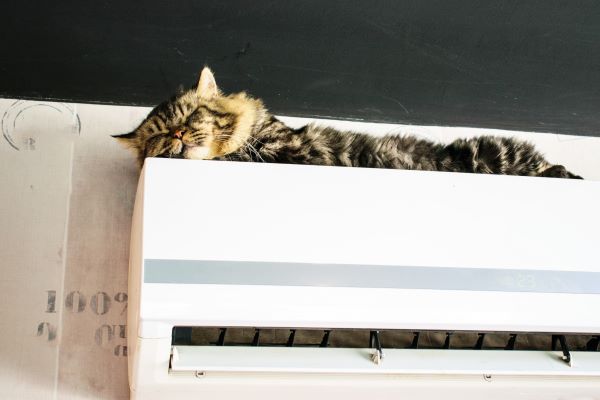It’s no secret that human health is directly tied to air quality. Since Americans spend about 90 percent of their time indoors, that means maintaining healthy indoor air quality is vital for everyone. And nowhere is it more important than at home, where people spend most of their time. How do you do this? It starts by maintaining your HVAC system. You can work with your local heating and cooling services to make a positive impact on your indoor air quality.
In this article from All Weather Heating & Cooling, we’ll explain just what it means to have clean air in your home, as well as why your air quality is so directly connected to the proper functioning of your HVAC system.
Air Quality and Your Health
If you want to see the connection between air quality and health, look at the studies carried out in the wake of the Clean Air Act, originally passed in the United States in 1963. By cutting down on smog and other pollutants, this law cut down on the amount of particulate matter in the atmosphere. In turn, researchers detected a drop in many common respiratory diseases, including asthma, allergies, and bronchitis. Improving the air quality even seemed to lead to a drop in the instances of heart attacks and infant mortality.
By the same token, recent studies have also shown that contaminants in the air reduce life expectancy by an average of about two years. According to the linked article, this is more than smoking or alcohol.
When you think about it, none of this is particularly surprising; the human respiratory system is particularly sensitive. And while your lungs are good at filtering out contaminants in the air, over time, those contaminants will build up in your body, negatively impacting your health.
The Air in Your Home
There are several factors that impact the air quality inside a house or other building. Of course, if the health of the air in the region in which you live isn’t particularly good, then airborne contaminants found outside will make their way into your home. However, there are also other elements that can negatively impact your indoor air quality.
Dust is a major cause of respiratory problems for the residents of a building. Most dust is actually made of dried skin cells that have sloughed off, although it can also come from any number of other sources. Frequently, it’s tracked inside when you enter the home, sometimes on your shoes or other clothing. Unsurprisingly, pet dander is also a major contributor to the dust that circulates throughout a building.
Another problem that is fairly unique to houses is mold. The moisture that slips into a building during humid or rainy weather conditions encourages the growth of fungi, which release spores as they grow. These spores are often mildly toxic to humans and can exacerbate a variety of health conditions.
Your HVAC System: Does It Help or Harm?
Most home HVAC systems operate by circulating air throughout the home via a system of ducts. This means that, when you activate your air conditioner or furnace and the air is brought to temp, the now-cooled or -heated air will then be transported into each room by a large fan, which forces it through the ducts and out of the vents.
As you are also probably aware, these HVAC systems are only really effective when you close all the doors and windows, minimizing the outdoor air that can make its way in or out. This means that the same air is effectively circulated and recirculated throughout a building.
When the blower fan switches on to transport heated or cooled air throughout your home, it also has the potential to transport any contaminants in the air. Over time, more and more dust can build up inside the ducts. This means that each time you switch on the HVAC system, all of that dirt, dust, mold, and pet dander will be blown into the rooms of your home.
Your HVAC system is built to counter this. Built-in filters capture the dust and other particulate matter, keeping the air clean and healthy to breathe. The best of these are known as HEPA filters. HEPA stands for “high efficiency particulate air” and refers to air filtration systems that can catch even the smallest contaminants, cutting down on as much as 99.7 percent of dust and other pollution.
However, if not maintained, over time, even the best filters will build up so much dust and dirt that they become clogged. This will cause them to no longer be effective, and your HVAC system will once again begin circulating harmful contaminants throughout the home. This is why heating and cooling services are so important.
How Your HVAC Professional Can Help
A highly functioning HVAC system contributes to healthy air quality in the home. It’s only when this HVAC system is neglected that it will turn against you, eventually doing more harm than good. However, regular maintenance from professional heating and cooling services can go a long way toward ensuring your indoor air quality remains high.
Ideally, you should have a regular inspection and tune-up performed on your HVAC system at least once a year. This will not only ensure that the air in your home stays clean. It will also reduce the chances of your cooling system breaking down at an inconvenient time and forcing you to shell out for a costly emergency repair.
When you contract an HVAC professional from All Weather Heating & Cooling, we will clean or change the filters heating and cooling systems as part of our regular maintenance checklist. We also clean the ducts themselves, preventing unhealthy buildup of dust and other contaminants. Regular maintenance can also prevent other issues that negatively impact indoor air quality, such as carbon monoxide leaks from the furnace or mold growth due to fluids leaking from the air conditioner.
Contact us today to schedule a maintenance visit for your home cooling system. By improving your indoor air quality, we’ll help to ensure your home stays healthy, year after year.

